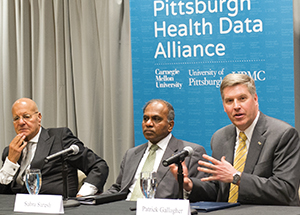Pitt, CMU, UPMC Form Alliance to Transform Health Care through Big Data
The University of Pittsburgh, Carnegie Mellon University, and UPMC have formed the Pittsburgh Health Data Alliance in an effort to harness huge quantities of health information to better guide medical care and provide insights into disease.

The alliance represents a wide-reaching commitment to advance technology and create health care innovations that will result in progress and spin-off companies, further strengthening the region’s economic development.
“Through this partnership, our brilliant scientists at Pitt and CMU will have unprecedented resources for turning their innovative ideas into products and services that can truly better the lives of patients and society,” said Pitt Chancellor Patrick Gallagher. “The knowledge created here will result in the spin-off of many new companies and thousands of new jobs over the next decade.”
The alliance, to be funded by UPMC, will see its work carried out by Pitt-led and CMU-led centers, with participation from all three institutions. The centers will seek to transform the explosion of health-related data into new technologies, products, and services. It is hoped that an improved ability to manage data will change how diseases are prevented and how patients are diagnosed, treated, and engaged in their own care.
Today’s health care system generates massive amounts of data—patient information in the electronic health record, diagnostic imaging, prescriptions, genomic profiles, insurance records, even data from wearable devices. Information has always been essential for guiding individuals’ care, but computer tools now make it possible to use data to gain a deeper understanding of disease.
For example, the use of smart data could help hospitals and doctors rapidly detect potential new disease outbreaks and immediately alert staff and authorities to take appropriate actions.
Using health care data to its full potential will require close collaboration to bring together leading health sciences research at Pitt, world-class computer science and machine learning at CMU, and the clinical care, extensive patient data, and commercialization expertise at UPMC. The close proximity and world-leading talent among these organizations provide the ideal setting to transform all aspects of health care, not only in Western Pennsylvania but around the world.
“The complementary strengths of the alliance’s partner institutions will allow us to re-imagine health care for millions of people in our shared, data-driven world,” said Subra Suresh, president of CMU. “Through this collaboration, we will move more rapidly to immediate prevention and remediation, further accelerate the development of evidence-based medicine, and augment disease-centered models with patient-centered models of care.”
The new research centers at Pitt and CMU will be funded over the next six years by UPMC and also will benefit from several hundred million dollars in existing research grants at all three institutions. They promise to create what UPMC CEO Jeffrey Romoff calls an “innovation ecosystem” for health data in the region.
“We are unlocking the potential of data to tackle some of our nation’s biggest challenges: raising the quality and reducing the cost of health care. Not only will this effort benefit patients, but it also will accelerate Pittsburgh’s revitalization,” Romoff said. Corporate partners and entrepreneurs from around the world will want to be close to this health care data hub, he predicted, just as Google, Apple, and Disney already have space in or near Oakland to be close to CMU’s and Pitt’s talented faculty and students.
Initially, the Pittsburgh Health Data Alliance will include two research and development centers: the Center for Commercial Applications of Healthcare Data (CCA), spearheaded by Michael Becich, chair of Pitt’s Department of Biomedical Informatics; and the Center for Machine Learning and Health (CMLH), led by founding director Eric Xing, a professor in CMU’s Department of Machine Learning. Scientists from all three institutions will participate in the work of each center.
Pitt’s Center for Commercial Applications of Healthcare Data will research and invent technology for potential use in commercial theranostics and imaging systems for patients and doctors. (Theranostics works to develop individualized therapies for various diseases, and to combine diagnostic and therapeutic capabilities.) These technologies will be based on intelligently engineered big data solutions. Some areas of focus for the center will be: personalized medicine for understanding diseases such as cancer and various lung disorders; genomics and imaging data; and methods for data capture and health care analytics. Key goals are new technologies and methods to create actionable information.
CMU’s Center for Machine Learning and Health will work on complex problems at the intersections of health care and machine learning. Data from sources as varied as electronic medical records, genomic sequencing, insurance records, and wearable sensors will be used to directly improve health care. For example, imagine a smartphone app that suggests the single dietary change that will most improve your health, based on your genetic makeup and medical history. Or suppose a physician receives an automatic alert when a patient enters the earliest stages of rejecting a transplanted organ, prompting immediate treatment. The center will focus on five areas: big health care data analytics; personalized medicine and disease modeling; issues of privacy, security, and compliance in the context of big data; data-driven patient and provider education and training; and a general framework for big data in health care.
UPMC Enterprises, the commercialization arm of UPMC, will lead efforts to transform these innovative ideas into new companies and jobs, building on its nearly 20-year track record of investing in and growing companies that solve health care problems.
For more information, visit www.healthdataalliance.com.
Other Stories From This Issue
On the Freedom Road

Follow a group of Pitt students on the Returning to the Roots of Civil Rights bus tour, a nine-day, 2,300-mile journey crisscrossing five states.
Day 1: The Awakening
Day 2: Deep Impressions
Day 3: Music, Montgomery, and More
Day 4: Looking Back, Looking Forward
Day 5: Learning to Remember
Day 6: The Mountaintop
Day 7: Slavery and Beyond
Day 8: Lessons to Bring Home
Day 9: Final Lessons

